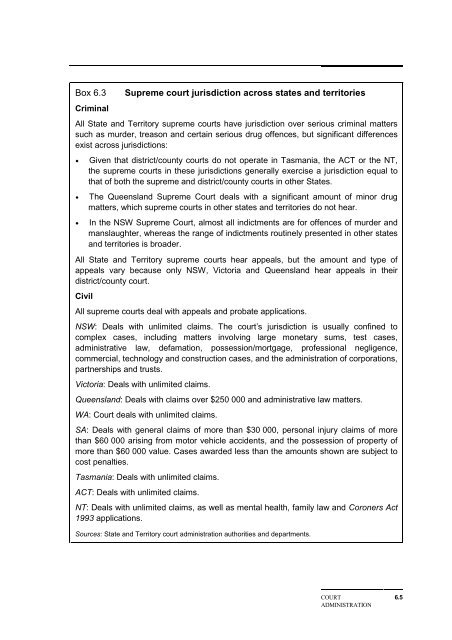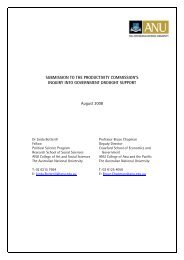PDF 0.4 MB
PDF 0.4 MB
PDF 0.4 MB
You also want an ePaper? Increase the reach of your titles
YUMPU automatically turns print PDFs into web optimized ePapers that Google loves.
Box 6.3<br />
Criminal<br />
Supreme court jurisdiction across states and territories<br />
All State and Territory supreme courts have jurisdiction over serious criminal matters<br />
such as murder, treason and certain serious drug offences, but significant differences<br />
exist across jurisdictions:<br />
• Given that district/county courts do not operate in Tasmania, the ACT or the NT,<br />
the supreme courts in these jurisdictions generally exercise a jurisdiction equal to<br />
that of both the supreme and district/county courts in other States.<br />
• The Queensland Supreme Court deals with a significant amount of minor drug<br />
matters, which supreme courts in other states and territories do not hear.<br />
• In the NSW Supreme Court, almost all indictments are for offences of murder and<br />
manslaughter, whereas the range of indictments routinely presented in other states<br />
and territories is broader.<br />
All State and Territory supreme courts hear appeals, but the amount and type of<br />
appeals vary because only NSW, Victoria and Queensland hear appeals in their<br />
district/county court.<br />
Civil<br />
All supreme courts deal with appeals and probate applications.<br />
NSW: Deals with unlimited claims. The court’s jurisdiction is usually confined to<br />
complex cases, including matters involving large monetary sums, test cases,<br />
administrative law, defamation, possession/mortgage, professional negligence,<br />
commercial, technology and construction cases, and the administration of corporations,<br />
partnerships and trusts.<br />
Victoria: Deals with unlimited claims.<br />
Queensland: Deals with claims over $250 000 and administrative law matters.<br />
WA: Court deals with unlimited claims.<br />
SA: Deals with general claims of more than $30 000, personal injury claims of more<br />
than $60 000 arising from motor vehicle accidents, and the possession of property of<br />
more than $60 000 value. Cases awarded less than the amounts shown are subject to<br />
cost penalties.<br />
Tasmania: Deals with unlimited claims.<br />
ACT: Deals with unlimited claims.<br />
NT: Deals with unlimited claims, as well as mental health, family law and Coroners Act<br />
1993 applications.<br />
Sources: State and Territory court administration authorities and departments.<br />
COURT<br />
ADMINISTRATION<br />
6.5
















